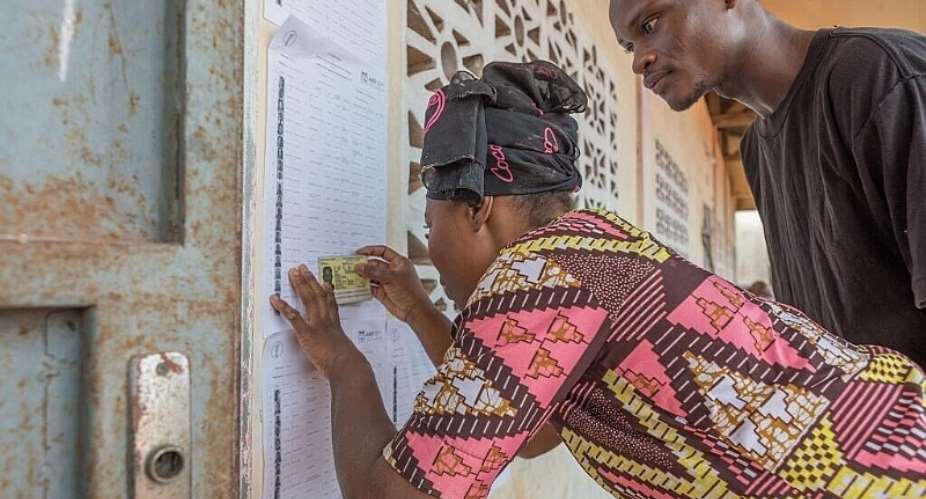Benin's pro-government parties have won a majority of seats in Sunday's parliamentary elections, the country's constitutional court announced Thursday. The vote also marked the return of the opposition after a four-year absence.
Sunday's vote, which went ahead peacefully, was a test for the West African state where President Patrice Talon has promoted development but critics say democracy has gradually been eroded under his watch.
It was the first time the opposition was participating in elections since businessman Talon came to power in 2016.
Over six million Beninese were called to elect 109 MPs.
Pro-Talon parties, the Republican Bloc and the Progressive Union for Renewal parties together won 81 out of the 109 seats, said Razaki Amouda Issifou, president of the constitutional court.
The opposition Democrats party gained 28 seats, he said, adding that voter turnout was 37.79 percent.
Seven political parties – including three allied to the opposition – were allowed to take part in the election.
Only parties that win more than 10 percent of the vote are eligible to get parliamentary seats, according to a proportional system.
Earlier on Thursday, Democrats' party leader Eric Houndete denounced the result, saying there had been "flagrant" ballot box stuffing, rigging and vote buying by the two pro-government parties, though without providing evidence.
"The Democrats party rejects this result, which does not reflect the will of the people to make our party the first political force in our country," Houndete said.
Results can be contested for a period of 10 days following the official proclamation of results.
Jailed opponents
In 2019, opposition parties were effectively barred from participating in a legislative ballot due to stricter election rules, resulting in a parliament dominated by government supporters.
That vote was marred by deadly clashes in an opposition stronghold, historic low turnout and an internet blackout – rare events in Benin.
Since Talon first came to office and after getting re-elected in 2021, most of his opponents have been jailed or have gone into exile.
- Benin President Patrice Talon pledges not to seek third mandate
- Benin opposition leader Madougou sentenced to 20 years in prison
This year's legislative elections were key for the opposition in preparation for presidential elections in Benin in 2026 when candidates will need support from lawmakers to be registered.
Parliament also plays a role in the composition of the constitutional court, which oversees rulings on election disputes.
Its mandate ends this year and four new judges will be appointed by lawmakers while three are chosen by the president.
(with AFP)





 Minority will expose the beneficial owners of SML, recover funds paid to company...
Minority will expose the beneficial owners of SML, recover funds paid to company...
 Prof. Opoku-Agyemang has ‘decapitated’ the NPP’s strategies; don’t take them ser...
Prof. Opoku-Agyemang has ‘decapitated’ the NPP’s strategies; don’t take them ser...
 Abubakar Tahiru: Ghanaian environmental activist sets world record by hugging 1,...
Abubakar Tahiru: Ghanaian environmental activist sets world record by hugging 1,...
 Prof. Naana Opoku-Agyemang will serve you with dignity, courage, and integrity a...
Prof. Naana Opoku-Agyemang will serve you with dignity, courage, and integrity a...
 Rectify salary anomalies to reduce tension and possible strike action in public ...
Rectify salary anomalies to reduce tension and possible strike action in public ...
 Stop all projects and fix ‘dumsor’ — Professor Charles Marfo to Akufo-Addo
Stop all projects and fix ‘dumsor’ — Professor Charles Marfo to Akufo-Addo
 Blue and white painted schools will attract dirt shortly – Kofi Asare
Blue and white painted schools will attract dirt shortly – Kofi Asare
 I endorse cost-sharing for free SHS, we should prioritise to know who can pay - ...
I endorse cost-sharing for free SHS, we should prioritise to know who can pay - ...
 See the four arsonists who petrol-bombed Labone-based CMG
See the four arsonists who petrol-bombed Labone-based CMG
 Mahama coming back because Akufo-Addo has failed, he hasn't performed more than ...
Mahama coming back because Akufo-Addo has failed, he hasn't performed more than ...
